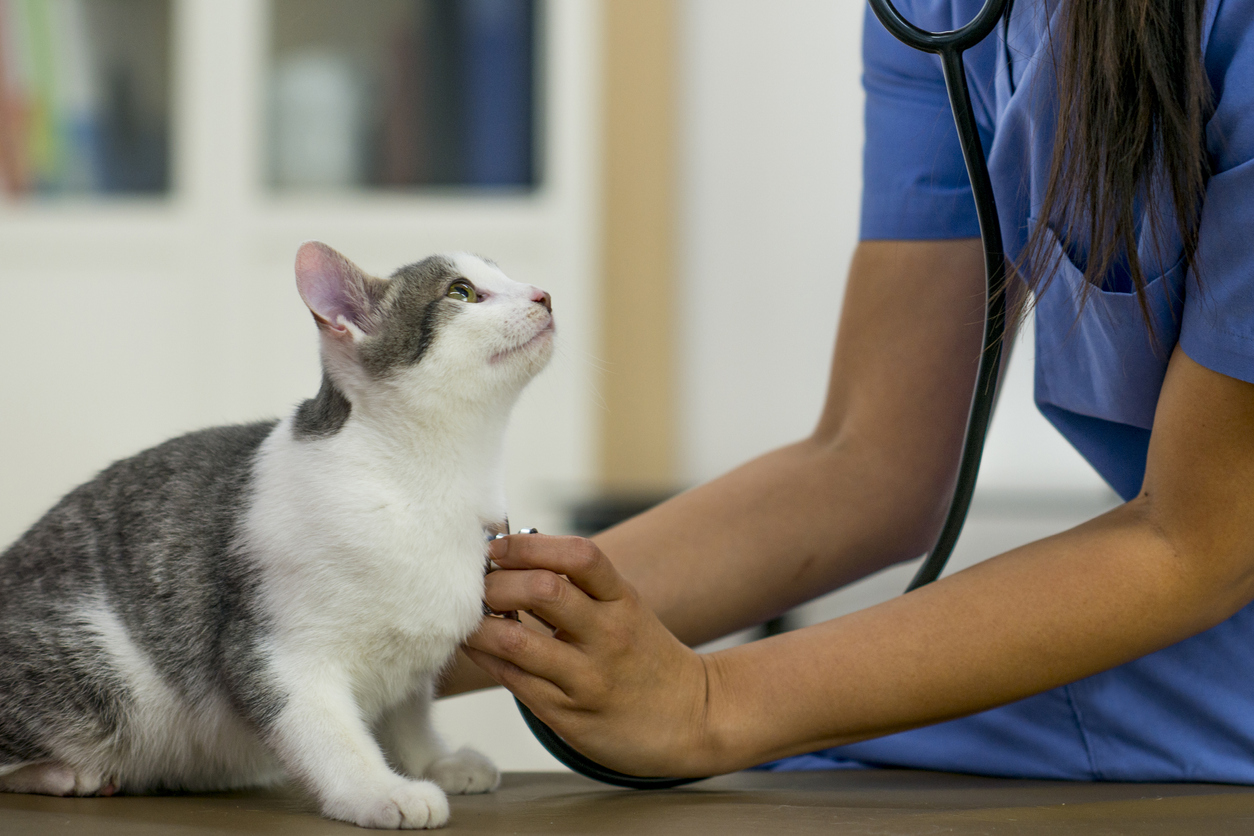What are Intestinal Worms?
Intestinal worms are parasites that often inhabit the intestines of animals and feed on the blood or nutrients found there. Depending on the site of their attachment, the age, and the health of the animal, they may produce a variety of symptoms.
The most common worms affecting dogs and cats are:
- Hookworm
- Whipworm (dogs only)
- Roundworm
- Tapeworms, including the flea tapeworm and the hydatid tapeworm
Intestinal worms can infect pets in a variety of ways, such as through fleas (in the case of the flea tapeworm), the faeces or flesh or other animals, their mother’s milk, the placenta in gestation, or from the soil and surroundings.
Some intestinal worms affecting pets can also become Zoonotic diseases, meaning that humans can be affected. Children are more likely than adults to contract intestinal worms from pets. Hookworm can be contracted by consuming the larvae unintentionally or by walking on contaminated ground. They might unintentionally consume tapeworm eggs and get an infection. In humans, the hydatid tapeworm (Echinococcus granulosus) can lead to serious disease.
Signs & Symptoms
Symptoms of intestinal worm infection are dependent on factors including the type of worm, the age of the pet and the immune system of the pet. PetSure claims data shows that most cases of worm infestation occur in puppies under a year old. In cats, most cases of worm infestation occurs in cats and kittens under two years old*. You may even notice moving worm parts in your pet’s stools! Pets are more likely to suffer severe intestinal worm damage if they are unwell, or immune suppressed for another reason. This is why healthy adult pets are unlikely to exhibit symptoms of intestinal worm infection, and you may not be aware at all if your adult pet has worms.
Because of this, it is very important to maintain a regular schedule of worm prevention so that your pet does not become overrun by them, and so that your family and other pets don’t catch them.
If you suspect your pet may have worms or is suffering from these signs, don’t hesitate to get in touch with your veterinarian for advice.
Symptoms of Intestinal worms
| Worm type | Symptoms |
| Hookworm | Diarrhoea with blood, lethargy, “potbellied” appearance, anaemia. Can cause death. |
| Whipworm | Dogs only. Diarrhoea with blood and mucous, straining to defecate. |
| Roundworm | Vomiting, lethargy, diarrhoea, “potbellied” appearance, failure to thrive in puppies and kittens. Can cause death. |
| Tapeworm | “Scooting” (itchy bottom), weight loss, diarrhoea, vomiting, worm segments on stool or around pets’ bottom. |
Diagnosis
Diagnosing intestinal worms in dogs and cats starts with a thorough clinical examination by the veterinarian. The veterinarian will also ask about the history of the pet, which will include the symptoms the pet is experiencing, previous worming products and timing, and other pertinent information such as exposure to other animals or their stools, breeder information and so forth.
A common way to check for intestinal worms is by checking a sample of stool for the presence of adult worms or eggs under a microscope. In some cases, a blood test may be ordered to check for signs that the immune system is reacting to the presence of parasites – called antibodies.
Treatment
Treatment for intestinal worms in dogs and cats typically involves the use of medications (anthelmintics) that kill the parasites. The type of medication used will depend on the type of worm and the severity of the infestation. Some common medications used to treat intestinal worms include fenbendazole, pyrantel pamoate, and praziquantel. These medications are available in different forms, including tablets, chewable treats, and liquids.
In addition to killing the parasites, supportive care may be necessary to manage any symptoms the animal may be experiencing, such as dehydration or anaemia. This may include administering intravenous fluids, blood transfusions and appropriate nutrition.
Recovery
It’s important to work closely with your veterinarian to develop an appropriate treatment plan for your pet. With proper treatment, most cases of intestinal worms can be effectively managed, and your pet can return to good health.
Prevention
Prevention is key when it comes to intestinal worms in dogs and cats. Regularly deworming your pet and practicing good hygiene, such as washing your hands after handling your pet and cleaning up after them, can help reduce the risk of infestation. It’s also important to keep your pet away from areas where other animals may defecate, such as dog parks or community areas.
Not all products treat tapeworm, so check the product label carefully as you may need a separate product for tapeworms. If in doubt, speak to your veterinarian who will be able to recommend an appropriate worming product for your pet.
Occasionally the situation arises where a new puppy or kitten arrives with worms. Make sure to have new additions to the family checked over thoroughly by the veterinarian and a worming plan implemented straight away if in doubt of the worming status of the pet. Always check with the breeder or shelter when the last time the pet was wormed and with what product, as not all products treat the same organisms.
Frequently Asked Questions
There are several types of intestinal worms that can infect cats. The most common intestinal worms in cats include:
Roundworms: These are long, white worms that live in the small intestine of cats. They can cause vomiting, diarrhea, and a pot-bellied appearance. Kittens can become infected with roundworms from their mother’s milk.
Tapeworms: These are long, flat worms that live in the small intestine of cats and can cause weight loss, vomiting, and diarrhea.
Hookworms: These are small, thin worms that attach themselves to the lining of the small intestine and feed on blood. They can cause anaemia, weight loss, and bloody diarrhea. Hookworms are typically spread through contact with contaminated soil or stools but can also be passed through mothers’ milk.
Whipworms: These are small, thread-like worms that live in the large intestine of cats. They can cause diarrhea, weight loss, and dehydration. Whipworms are typically spread through contact with contaminated soil or faeces.
Tapeworms are typically spread through fleas or by ingesting an infected animal.
Fleas are a common way for worms to infect pets. Some types of worms, such as tapeworms, use fleas as an intermediate host to complete their life cycle.
When an animal ingests an infected flea while grooming themselves, the tapeworm larvae inside the flea can then develop into adult worms in the animal’s intestines. This is why it’s important to not only treat your pet for fleas, but also for worms, as a flea infestation can lead to a worm infestation.
Fleas can also transmit other diseases including bacterial infections. This is another reason to ensure that your pets are up to date with flea prevention.
1. Before administering any medication, it’s always a good idea to touch base with your veterinarian. They can help recommend a specific deworming schedule based on your pet’s age, health status, and lifestyle.
2. There are many types of deworming products available which include tablets, liquids, and topical preparations. Your veterinarian can help recommend one that is easiest for you to administer to your best friend.
3. Always be sure to follow the instructions, which include the dose and frequency of administration.
4. Always keep an eye on your pet after giving them any medication to check for adverse reactions.
It is possible to catch some intestinal worms from your pets. Certain types of intestinal worms, such as roundworms, hookworms, and tapeworms, can be transmitted from animals to humans through contact with infected poop, contaminated soil, or by ingesting fleas or other parasites that carry the worms. It’s essential to practice good hygiene habits, such as washing hands frequently, especially after handling pets, and making sure your pets are dewormed regularly to minimize the risk of transmitting intestinal worms to humans. If you suspect that you or a family member may have contracted intestinal worms, consult with your doctor.
Occasionally it may be possible to see worms in your pet’s poop. If you have recently de-wormed your pet, this is a sign the products are working but you may need to check with your veterinarian about a follow-up dose to make sure they are all gone. You are most likely to be able to see Roundworms, who are long, and spaghetti like in appearance, or Tapeworm segments, that are often described as looking like grains of rice or sesame seeds on poop or around your pet’s bottom. Make sure you always observe your pets’ poop for abnormalities and check with your veterinarian if you notice anything out of the ordinary. Don’t forget to take a picture to show your veterinarian or a sample if possible.
There are several intestinal worms that dogs can get including Roundworms, Hookworms, Tapeworms, and Whipworms. There are also worms like heartworm and rat lungworm (Angiostrongylus cantonensis) that are less common and can also affect dogs.
According to PetSure data in 2022, intestinal worms in dogs had an average claimed cost of $407.00 with the highest claimed cost being $4,415.00. In cats, the average claimed cost for intestinal worms was $357.00, and the highest claimed amount was $1,127.00.*
Intestinal worm parasitism is generally covered by comprehensive accidental injury and illness pet insurance policies administered by PetSure (check our brand partners at petsure.com.au/partners), unless related to a pre-existing condition or exclusion. Please refer to your policy documents and Product Disclosure Statement (PDS) for more information.
Preventative and routine items such as intestinal worming products whether recommended by your veterinarian or not are not covered by PetSure policies.
Please refer to your policy documents and Product Disclosure Statement (PDS) for more information
*Reimbursement for these claims would be subject to limits, such as annual benefit limits or sub-limits, benefit percentage, applicable waiting periods and any applicable excess. Cover is subject to the policy terms and conditions. You should consider the relevant Product Disclosure Statement or policy wording available from the relevant provider. Treatment relates to Heartworm and all medically related conditions in that policy period.
If you’re looking to purchase pet insurance, always consider the PDS to see if the product is right for you. PDS and TMD available on our partners’ websites
References
Investigation and familiarization with internal and external parasitic diseases of pets
Parasites in pets: Understanding prevalence and perception
Virbac Australia, Intestinal worms in dogs and cats
Pet insurance can help by covering a portion of the eligible vet bill if the unexpected happens. Because it is difficult to predict the costs of veterinary care, it can help to have measures in place to help prepare for the unexpected. Check out our partner network and explore our policy tools to find a pet insurance policy.
Not all conditions or items are covered by Pet Insurance. Refer to the applicable Product Disclosure Statement for information about coverage and exclusions.



 Fact checked
Fact checked





